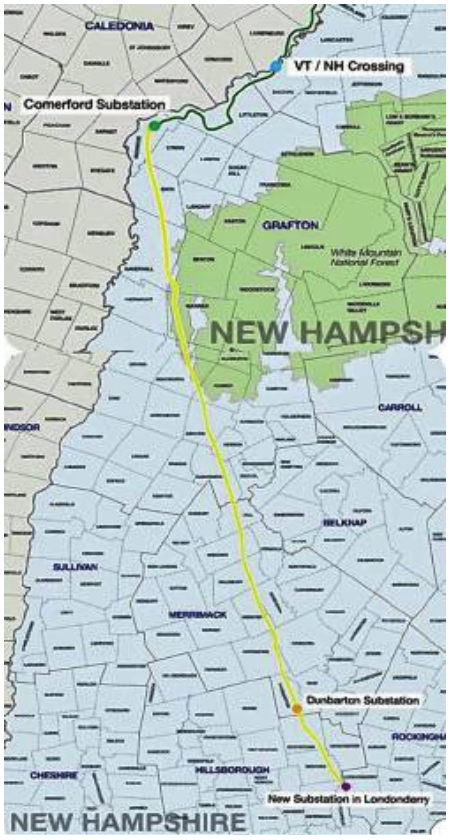Federal support needed to connect New Hampshire with HydroQuebec
National Grid went before Concord City Council a couple weeks ago to start the long process of expanding a power line through the state bringing electricity from HydroQuebec, spurred by the possibility of hefty federal support. But they’re quick to say that it’s not really all that similar to the failed Northern Pass project.
“Our community still suffers from PTSD with regard to Northern Pass,” Councilor Jennifer Kretovic told the council. “When you mention the words HydroQuebec, that will automatically raise concern.”
Northern Pass was a decade-long effort by Eversource to build a power line through the state, but the plan was canceled in 2017 after years of opposition from locals concerned about the damage created by new towers, power lines and rights of way, including a new corridor into the White Mountain National Forest.
“Unlike previous attempts to bring in more transmission and hydropower from Quebec, our project does not require any new rights of way,” said Terran Hill, director for the project called Twin States Clean Energy Link, during Monday’s presentation to the council.
A map shows where the Twin States Clean Energy Link transmission project would cross into New Hampshire from Vermont and run down the state to Londonderry. Yellow is the existing overhead transmission corridor while green is underground cable along state roads.
National Grid will be asking for letters of support from Concord and other communities as they compete for a slice of the $2.5 billion Transmission Facilitation Program, a federal project to strengthen the nation’s power grid.
Twin State Clean Energy Link is competing with eight other large transmission proposals in the program, with winners likely to be announced this fall. Under the program, the Department of Energy would buy a portion of the power, acting as an “anchor tenant” to remove some of the financial risk. It’s not clear whether National Grid would go forward if it does not succeed in its bid.
The line barely affects Concord, cutting through about 2 miles in the city’s northwest corner after coming down through Salisbury and Webster then continuing through Hopkinton and Dunbarton.
National Grid says Concord could earn $75,000 a year in extra property taxes if it is built.
In the region, as in much of New Hampshire, the line would use a transmission corridor built in the mid-1980s with three towers that carries more than 1,000 megawatts of hydropower from Quebec to Londonderry, where it enters the New England grid.
National Grid says it can carry an extra 1,200 megawatts along the corridor by upgrading existing wires and using technology improvements, although it will have to increase the height of “about 30 percent” of the towers along the way, said Jessica Farrell, lead engineer for the project. The towers could be raised an extra five to 30 feet, because higher voltage needs to be further from the ground for safety reasons.
Where the power lines don’t use existing towers and rights of way in Vermont and New Hampshire, National Grid says, they will be buried under state roads. That includes New Hampshire Route 135 between Dalton on the Connecticut River and Monroe, at which point the route would hook into a high-voltage transmission corridor that has existed for four decades.
One difference between Northern Pass and Twin States is that the new proposal would be bi-directional, allowing electricity to be sent up to Quebec and sold if the situation arises such as if solar and wind power surges during a time of low demand in New England.
This article is being shared by partners in The Granite State News Collaborative. For more information, visit collaborativenh.org.